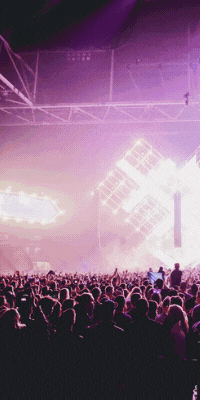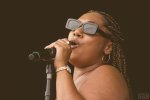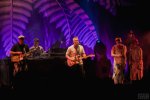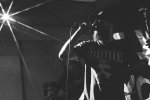Sounds Aotearoa 2012: Part One - The Seminars
Part One: The Seminars
Wonderful weather in New Plymouth for this, perhaps the last Sounds Aotearoa to be held in the scenic Taranaki. There were mixed responses to whether Sounds would be missed in Taranaki. The locals were steadfast in their belief that Taranaki is the best place for the event, while out-of-towners seemed by and large unphased, some even welcomed the change. The speculation of outsiders was perhaps the event would pull bigger crowds if it where to be held somewhere like Wellington or Auckland, which are full of struggling musicians.
But I see the appeal of the locale. The city was awash with memories from when New Plymouth was my home town, some twenty or so years ago. Despite being a massive detour away from our other main centres, Taranaki still has a lot going for it. Between the mountain and the sea there’s surf, snow and out in Stratford, speedway of sorts. Aside from the scenery the cafes and restaurants are open late into the night and the people are receptive and welcoming, friendly even, not the kind of thing you see many other places in New Zealand these days.
The geographic isolation should pose no obstacle, and is certainly no excuse. Buses are still a socially acceptable mode of transport and cheaper than a car. They can even be a karma boost when you help the guy in front of you find his phone, offer a pregnant mother your seat or allow the person next to you fall asleep on your lap after their head slipped off your shoulder.
If you are in any way involved in the music industry, as a band, a promoter, a manager, a producer, you need to get to Sounds Aotearoa. No where else are you be exposed to the important figures in the national and international music industry, both corporate and Indie, and given the unbridled chance to network, share your ideas and learn from those who have been there and those who can get you there.
What is Sounds Aotearoa?
Sounds Aotearoa is a two day event broken each day into two parts, the seminars and the showcases, both of which are as important as the other. There’s plenty of time to mingle and network in between and lunch, morning tea and refreshments were provided.
The seminars, which unfold not unlike a university lecture, cover most aspects of the music scene as it applies to New Zealanders. This year industry professionals and people in the know took the floor and share relevant information and offer guidance for those wishing to explore the digital world, embrace the cultural side of their music or tour their band overseas. These people had so much to share that I don’t think there was a time that a seminar didn’t run a little over. Despite the stress this might have caused the MC / Organiser, it all came together in the end.
I was lucky to be chosen to cover this event. I had initially planned to attend when I first heard about it, but money, location and employment made me reconsider. When the opportunity arose I jumped for it and don’t regret it. As a struggling pseudo-musician myself, every word in the seminars touched and shaped my understanding of where I want my music to go and how I can do it. Also in the audience were people from all walks of life, all pieces of the music industry machine, and most with genuine interest in what the speakers had to say. Others had more political motivations and used the question time to grill the speakers. I wish there had been more. Judging by the long silences in some seminar’s question time, as well as university lecture theatres around the country, it would seem the Kiwi way is to sit back and wait for someone else ask a question, and I am a Kiwi.
Culture was a common theme through the expo. Maori culture is one of the things that makes New Zealand and unique, yet as one politically minded listener put to the speaker from NZ on Air, there is a lack of Maori music, or at least music in Te Reo on the major radio stations. Even Mai FM feels more alternative mainstream nowadays. Someone argued that it is what the people want, American or British pop, by rights foreign music, to which the retaliation was it is the only choice the people are given.
I left that seminar realising there was a wide open market for Maori music and with the dream of making the first Maori Industrial Metal album. Then I got to the showcase and saw Nga Tae and my mind was blown. I’ve decided to leave the genre to those who do it best.
What I discovered over the two days is the playing the whole music game isn’t all that hard, once you have the knowledge that is. When trying to establish myself as a musician before hearing what these speakers had to say what I was effectively doing was putting together a chest of drawers without instructions and not realising I was missing pieces. I was working hard. I was trying things. But in the end I had me a chest of drawers that collapse at the slightest push. If you want somewhere to put your clothes, read the instructions. If you want to make it in the music industry, get the funding, support, legal advice, overseas tours, radio play… go to Sounds Aotearoa 2013.
Other Reviews By Peter-James Dries
 AJA - Album Review: Kawai
AJA - Album Review: Kawai
13 Dec 2024 // by Peter-James Dries
Bilingual albums shouldn’t be special; they should be the norm. Or at least more common.
Read More...
 Ra Charmian - Album Review: Waiata Wairua
Ra Charmian - Album Review: Waiata Wairua
08 Oct 2024 // by Peter-James Dries
Waiata Wairua is an album that wouldn’t feel out of place performed in a late night jazz hall in some alternate history where the successes of the Maori battalion lead to a proliferation of Te Reo worldwide. The sort of interest that saw your dad singing in French in the 60's, when Mireille Mathieu was knocking about.
Read More...
 Ben Lloyd - Album Review: Leap of Faith
Ben Lloyd - Album Review: Leap of Faith
26 May 2024 // by Peter-James Dries
For over 30 years, this self-taught rocker from Mt Maunganui has been writing music. Now, for the first time since 2013, we finally get to hear his songs.
Read More...
 Yann Le Dorré - Album Review: The Circus is Closed
Yann Le Dorré - Album Review: The Circus is Closed
19 Dec 2023 // by Peter-James Dries
“We are Sex Bob-Omb and we're here to make you think about death and get sad and stuff!” - Scott Pilgrim vs.
Read More...
 Sanoi - Album Review: Echoes Of Home
Sanoi - Album Review: Echoes Of Home
25 Nov 2023 // by Peter-James Dries
Electronica offers no escapism for me. It’s more of what I already have.
Read More...
 Throng - EP Review: Decoherence
Throng - EP Review: Decoherence
20 Oct 2023 // by Peter-James Dries
You know that thing where the letter B has a personality, or words have textures and colours? That’s called synaesthesia.
Read More...
 Fortress Europe - Album Review: Old World
Fortress Europe - Album Review: Old World
10 Oct 2023 // by Peter-James Dries
Have you ever been torn between listening to Mozart or Periphery? Does Epica have too much of that darn singing for your tastes?
Read More...
 Yurt Party - Album Review: Yurt Party
Yurt Party - Album Review: Yurt Party
07 Sep 2023 // by Peter-James Dries
It sure isn't summer, and this is really not the Balkans, but Yurt Party’s new self-titled album refutes that. Back with another one of them Balkan rocking beats, Yurt Party’s debut is jazzy, erratic, and full of zest and energetic grooves, with flavour notes of ska, dub, and bergamot.
Read More...
Most Viewed Artists
Latest Galleries
NZ Top 10 Singles
- APT.
ROSÉ And Bruno Mars - DIE WITH A SMILE
Lady Gaga And Bruno Mars - BIRDS OF A FEATHER
Billie Eilish - TASTE
Sabrina Carpenter - I LOVE YOU, I'M SORRY
Gracie Abrams - ESPRESSO
Sabrina Carpenter - SAILOR SONG
Gigi Perez - LOSE CONTROL
Teddy Swims - A BAR SONG (TIPSY)
Shaboozey - GOOD LUCK, BABE!
Chappell Roan








 Report A Problem
Report A Problem

